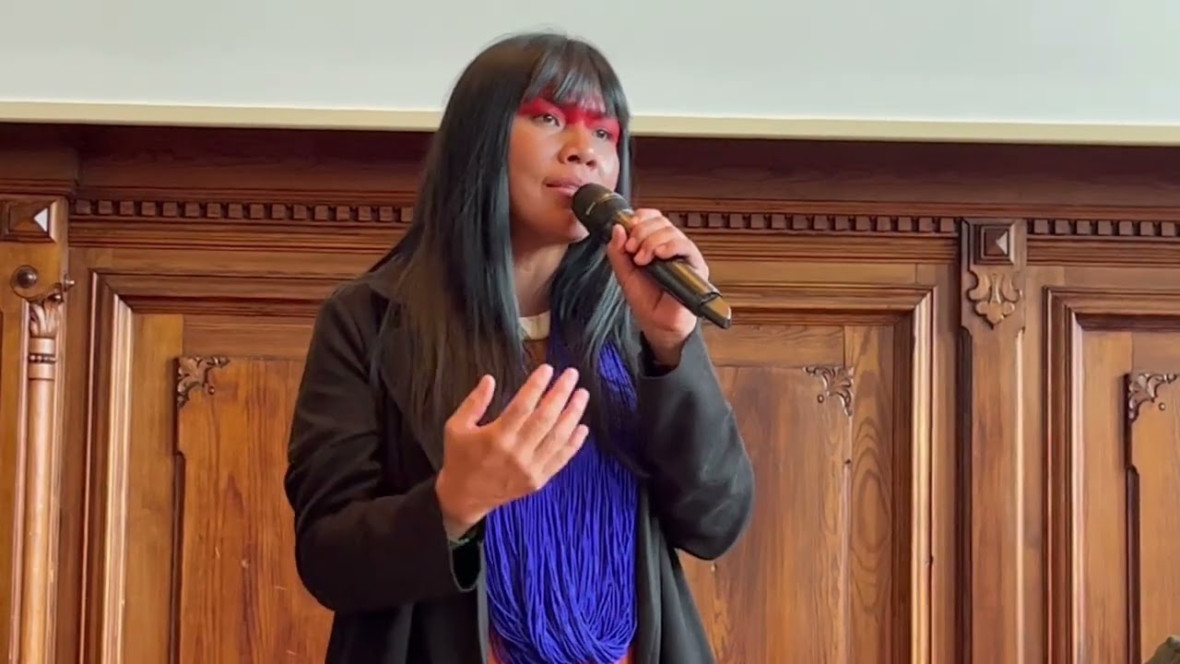Indigenous Leaders in Berlin: Together for the Rainforest
24.05.2023
In the struggle for their land and way of life, the indigenous Amazon peoples have already achieved a lot. But they need support in protecting their territories, which are so important for the global climate and biodiversity. During a European tour, a delegation of indigenous chiefs visited Berlin, met with the President of Germany and subsequently discussed their concerns at a public event.
On the afternoon of 16 May, the President of Germany, Frank-Walter Steinmeier, met with prominent indigenous leader Raoni Metuktire – now aged over ninety – and chiefs Bemoro Metuktire, Tapi Yawalapiti, and Watatakalu Yawalapiti. In the evening, the three younger leaders spoke at a public event organised by the non-governmental organisation AFV - Rainforest Organization, WZB Berlin Social Science Center and the Research Institute for Sustainability (RIFS) and hosted at the WZB.
Local action with global impact
Political scientist and RIFS research group leader Cecilia Oliveira opened the event with some brief remarks on the importance of the Amazon rainforest for the global climate and the achievements of Brazil's indigenous peoples. As Oliveira explained, the Amazon rainforest lies at the centre of global climate policy: clearing the entire rainforest and using the land for crop and livestock farming would cause the average global temperature to rise by 0.25 degrees Celsius.
Oliveira described the demarcation of indigenous territories in 1961 as a "legal milestone." Since then, the indigenous peoples of the Amazon have protected their territories using both traditional knowledge and new technologies: “Looking at the map today, the Xingu region is one huge green island." The implications of this achievement extend far beyond the local level: "The peoples of the Xingu region understood their planetary political role long before we did. They have done more to implement the Paris Agreement than many cities or regions." This struggle has also impacted perceptions of the Xingu indigenous peoples and diminished the power of colonial representation.
New momentum under Lula da Silva
In an effort to overcome the setbacks of recent years, President Lula da Silva has vowed to stop illegal logging. He has created a Ministry of Indigenous Peoples and decreed new indigenous reserves. In addition, he has reactivated the Amazon Fund for Forest and Climate Protection, of which Germany is a donor. According to chief Tapi Yawalapiti, these measures are important to stopping illegal logging completely by 2030 and designating more reserves. “We are in the process of filling the political vacuum in Congress today. Indigenous youth are in power. We are realizing the dream of our parents and grandparents." So far, only about a third of the Xingu indigenous lands have been demarcated.
Drones could aid in monitoring reserves
Chief Bemoro Metuktire highlighted the need to improve the protection of indigenous rights: "While our territories have been demarcated, there are still many incursions. Loggers, prospectors, and fishermen enter our reservations and steal our wealth." He explained that he understands the hardships facing many white Brazilians and called on the government to create alternative income opportunities. Drones could be used to help monitor protected areas, he suggested, and the Xingu peoples plan to earmark funds raised in Europe for this purpose.
A task for all humankind
Chief Watatakalu Yawalapiti, a leader of the Xingu women's movement, emphasized the role of education in the struggle for indigenous rights. Today, many Xingu people attended universities, spoke foreign languages, and were knowledgeable in law, politics and technology. All of this strengthened their capacity to stand up for their rights, she said. However, they would also like to see a greater willingness on the part of the majority society to learn from indigenous peoples: "We know how to live with the forest without destroying it, and we want to teach you." The preservation of the Amazon rainforest, Yawalapiti argued, is a task for all humankind and not the sole responsibility of indigenous peoples.
Media
Highlights from a Meeting with Distinguished Indigenous Leaders from Brazil

Contact

